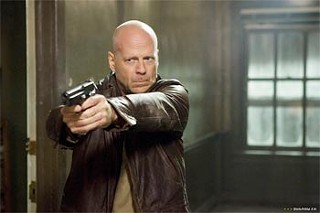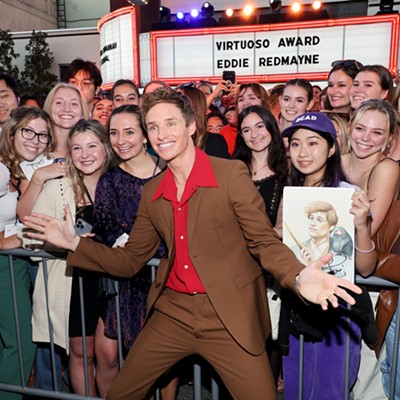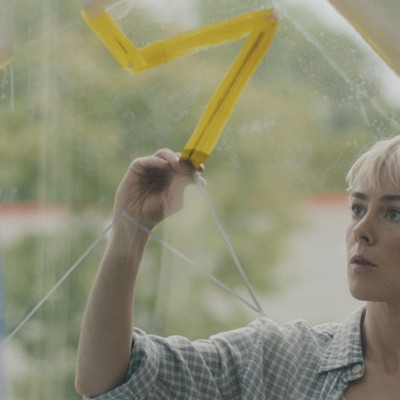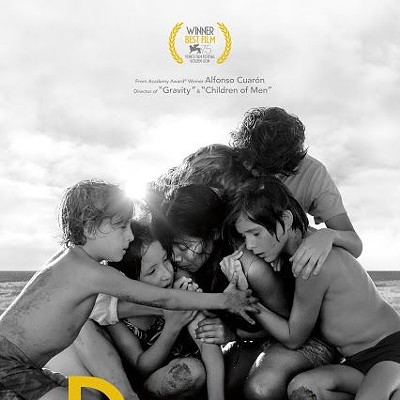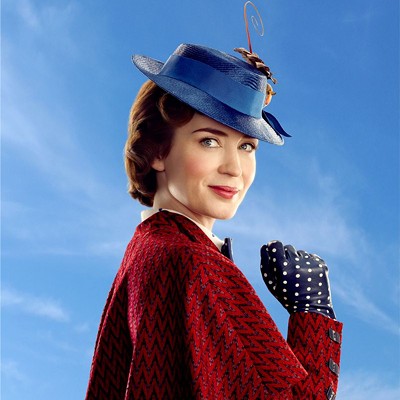Live Free or Die Hard **1/2
For whatever reason -- fat paycheck, wavering career, poor choice of available roles -- Bruce Willis has elected to return to his signature role as John McClane, and the end result is better than most years-after-the-fact sequels (Rocky Balboa, The Evening Star, Crocodile Dundee In Los Angeles). The twist here is that aging detective McClane, an old-fashioned guy used to 20th century modes of expression and ideas, finds himself battling cyber-terrorists who threaten to shut down the entire United States with a few strokes of a keyboard. The movie’s billing itself as the story of an “analog” cop living in a “digital” age, and we all know what that means. No mouse pads or monitors for our hero; instead, it’s all flying fists, rapid-fire weaponry and explosions. Lots of explosions. Yet even director Len Wiseman and scripter Mark Bomback don’t have complete faith in the cop’s old-fashioned heroics since they saddle him with a sidekick who’s a genius when it comes to computers. Matt Farrell (Justin Long, the “Mac” guy in those ubiquitous Apple commercials) is a Neo-inspired hacker who inadvertently helps the villain (an effective Timothy Olyphant) and his posse carry out their master plans. Marked for termination, Matt is only able to escape his would-be assassins with McClane’s help. An overlong running time allows matters to occasionally become stale (the blueprint calls for our protagonists to evade, fight, escape, repeat), although Willis does his part by tossing out those patented McClane quips with aplomb. And while there’s no denying that the picture is packed with memorable action sequences, the film often collapses into a heap of silliness, with McClane surviving some encounters that would tax all sorts of leaps of logic.
Sicko***1/2
As with past works by this controversial filmmaker, Michael Moore proves himself to be more a professor with some fanciful ways of explaining the matter at hand than a documentarian in the strictest sense of the term: He often places himself at the center of the spotlight, and he lets details fall by the wayside in his rush to accentuate the greater truth. Sicko, Moore’s take on the American health care crisis, is no different: One can quibble about the presentation or the soft-pedaling of certain points, but there’s no doubt that Moore’s heart is in the right place, or that, in a just world, his powerful picture would serve as an agent for change. Moore employs his latest film as a bludgeoning tool against insidious insurance companies and the corrupt politicians who let them get away with murder -- often literally. Moore doesn’t focus on the nation’s uninsured; instead, he centers on ordinary folks who do carry insurance yet are still denied basic rights by those more concerned with lining their own pockets than helping out their fellow Americans. Thus, we see how a grieving mother loses her baby daughter because her HMO forces her to seek help not at the closest hospital but at one further away. We gasp at how one man is turned down for an operation, only to result in his death several months later. We witness how a laborer who has accidentally cut off two of his fingers is told that, because of financial considerations, he has to decide which finger he wants to keep and which digit he can live without. And so on. Not surprisingly, Moore’s solution on how to wrest this nation away from the hands of the insurance companies, lobbyists and politicians is to provide universal health care for everyone. Moore then traces, in often amusing fashion, how the Republicans gasp at such a notion, calling it “socialized medicine” and linking it back to the Communists. Yet Moore also saves some barbs for Hillary Clinton, who once tried to tackle the health care issue (yet was beaten down by GOP misogynists like Newt Gingrich) but is now only too happy to accept campaign contributions from the health industry lobby. And in a brilliant bit, Moore wonders why the right-wing is so adamant against “socialized medicine” when we already have other “socialized” advantages (fire department, schools, libraries, etc.).
Ratatouille ***1/2
Cinema has given us so many marvelous movies set around the kitchen that it’s easy to lose count among the tantalizing dishes laid out on display. But onto a long list that includes Babette’s Feast, Eat Drink Man Woman, and Like Water for Chocolate, I never expected to add an animated yarn about a culinary rat. Ratatouille is the latest winner from Pixar, the animation outfit whose win-loss ratio has still managed to equal that of the ‘72 Miami Dolphins. Here, a dreamy rat who tries to get along with his more conventional family while also attempting the impossible (and the taboo) by forging a friendship with a human. The rat is Remy (voiced by Patton Oswalt), whose skills in the kitchen are exemplary, and the human is Linguini (Lou Romano), a skinny lad who possesses none of his late father’s superb culinary abilities. Since restaurant kitchens aren’t exactly rodent-friendly, and since circumstances force the singularly untalented Linguini to pass himself off as a master chef, the pair pool their resources to return a once-great Paris eatery, now struggling following the publication of a disastrous review by food critic Anton Ego (Peter O’Toole), back to its lofty position as one of France’s finest. As always seems to be the case with Pixar, the animation in Ratatouille far surpasses that of CGI imagery from competing studios, with characters emerging as fully formed, three-dimensional players (or as three-dimensional as cartoon characters can get). The attention to detail is startling, and there are some angles that may be commonplace in live-action features but are rarely attempted in toon flicks (I especially love the pen dropping).
Transformers ***
A movie about robots that turn into cars (and trucks and tanks and airplanes) would seem to have a more limited fan base than many other blockbuster wanna-bes, and the presence of Michael Bay (Armageddon, Pearl Harbor) as director certainly puts critics on alert. Yet perhaps the secret ingredient here is in the producing credits. Instead of Bay’s usual partner in crime, Jerry Bruckheimer, it’s Steven Spielberg who snags an executive producer citation, so it can’t be a coincidence that in its finest moments -- most contained within the first half of this 145-minute yarn -- this picture harkens back to the sort of filmic roller coaster rides that Spielberg often built during the 80s. What makes the initial hour-and-change so enjoyable is the expository material that former Alias scripters Roberto Orci and Alex Kurtzman bring to the table. After quickly explaining that two sets of intergalactic robots -- the heroic Autobots and the nefarious Decepticons -- have brought their battle to our planet, we’re introduced to various groups of characters who will eventually gather to help the good ‘bots defeat the evil ones. Chief among the human protagonists is Sam Witwicky (Shia LaBeouf), a teenager who’s so busy wooing a lovely classmate (Megan Fox) that he’s slow to realize that there’s more than meets the eye about his new Chevy Camaro. Meanwhile, in Qatar, two members (Tyrese Gibson and Josh Duhamel) of an army outfit find themselves trying to stay alive from the metallic menace that has wiped out their entire base. And back in Washington the U.S. Secretary of Defense (Jon Voight) tries to figure out what’s going on with the help of a computer analyst (Rachael Taylor) and her “advisor,” a computer hacker (Anthony Anderson). Bolstered by ample amounts of humor (a popular comedian makes an early appearance as a car salesman) and decidedly more character-driven than expected, Transformers for the most part does a fine job of balancing action with emotion, which makes the final half-hour -- wall to wall battles with little to individualize the raging robots on either side -- a bit of a slog. Still, it’s a given that Transformers fans won’t be disappointed. The shock is that the rest of us might not be, either.
Evening**1/2
Claire Danes, Toni Collette Michael Cunningham may have co-written the screenplay for Evening (along with original author Susan Minot), but those expecting a replay of the heady pleasures of The Hours (which had been adapted from Cunningham’s novel) might find themselves disappointed at the slightness of this latest work. That’s not to say that Evening is a turkey, but rather a delicate canary that never really finds its voice. Powered by an ofttimes unwieldy big-name cast, this is one of those dramas that wanders back and forth between two time periods. The earlier passages center on Ann Lord (Claire Danes), who arrives at the family estate of her best friend Lila (Mamie Gummer) to serve as the bridesmaid for her upcoming marriage-of-convenience. Lila’s brother Buddy (Hugh Dancy) loves Ann and hates the fact that Lila is throwing away her passion on someone not worthy of it. For her part, Ann finds herself attracted to Buddy’s best friend Harris (Patrick Wilson), and their fling leads to tragic consequences. The modern sequences focus on an elderly Ann (Vanessa Redgrave) now on her death bed, with her two dissimilar daughters (Toni Collette and Natasha Richardson) tending to her needs while also engaging in some heated sibling rivalry. Important matters of life are treated in fairly interesting ways, although director Lajos Koltai keeps the pathos on such a low simmer that the melodrama never wallops us as it should. As for the cast, Danes and Redgrave are fine in the lead roles, while Dancy acquits himself quite nicely in an erratic part that requires him to whiplash between heterosexual, homosexual and incestuous love without a moment’s notice. Meryl Streep and Glenn Close appear in small roles -- if this were a TV series, they’d be billed as “special guest stars” -- with Streep nicely underplaying and Close grotesquely overacting. Close’s crying fit is one of the few moments that tests out the high end of the theater’s sound system, but it’s an embarrassing bit, as unwelcome as Michael Moore at an Aetna board meeting.
Evan Almighty **
There’s not much to this film aside from shaky CGI effects, timid moralizing, and the sight of Steve Carell spinning his wheels in a role that fails to draw upon the immense comic talents displayed in The 40-Year-Old Virgin, Little Miss Sunshine and even his brief stint in the Paul Lynde role in the disastrous screen version of Bewitched. Playing the same part he essayed in Bruce Almighty, that of self-centered TV news anchor Evan Baxter, Carell immediately finds himself neutered by director Tom Shadyac and his passel of writers, as his character has morphed into a typical movie dad who places his own career above the needs of his wife (Lauren Graham) and children. Having been elected to Congress on the platform that he’ll “change the world,” Evan now finds his hands full delivering on that promise when God (returning Morgan Freeman) appears and instructs him to build an ark.
1408 **1/2
A fairly effective creepshow in which our protagonist only has to worry about a haunted room. But what a room! Hack writer Mike Enslin (an excellent John Cusack) has built a career penning guide books on supposedly haunted locales across America, and after years of doing so, he realizes, with the same level of smugness as Hilary Swank’s mythbuster in The Reaping, that there are no such things as ghosts and goblins and gremlins and golems. So when he receives a postcard from the Dolphin Hotel in New York telling him not to enter the establishment’s room 1408, he scoffs at the warning but elects to check it out anyway. His arrival is met with resistance by Gerald Olin (Samuel L. Jackson), the hotel manager. At first, the spooky proceedings are kept on a low-key simmer. But scripters Matt Greenberg, Scott Alexander and Larry Karaszewski don’t just adapt Stephen King’s short story; they stick a helium needle into it and expand it to grotesque proportions.
A Mighty Heart ***
Based on Mariane Pearl’s book A Mighty Heart: The Brave Life and Death of My Husband Danny Pearl, the film finds Angelina Jolie delivering a remarkably restrained performance as Mariane, whose husband (played by Dan Futterman), a Wall Street Journal reporter, is kidnapped while the pair are living in Pakistan in 2002. Six months pregnant, Mariane tries to stay optimistic in the face of this grim situation, using her own sources to track him down while also relying heavily on the aid of the Pakistani anti-terrorism unit, American diplomats and the FBI. In fact, her outer fortitude is occasionally misinterpreted as a lack of concern (i.e. the Lindy “The dingo’s got my baby” Chamberlain syndrome), which leads some to foolishly question her devotion to her husband. But all that matters to Mariane is having her spouse returned to her, and, given Hollywood’s propensity for promoting American know-how as well as its can-do attitude, it’s perhaps the movie’s most surprising development that the efforts of the Pakistanis, not the U.S. law officials, go the furthest toward cracking the case.
Ocean’s Thirteen ***
Isn’t it accepted -- in fact, isn’t it pretty much gospel -- that the third picture in any given trilogy is when the series has totally lost it, when the filmmakers have been completely replaced by pimps and profiteers? So how is it possible that Ocean’s Thirteen has emerged as the best of this franchise?
Fantastic Four: Rise Of The Silver Surfer **
It remains a mystery how the 2005 superhero yarn Fantastic Four grossed $154 million stateside, considering that most of its special effects were on the level of a 6-year-old floating his plastic boat in the bathtub. This time effects are a vast improvement. Would that the rest of this picture inspired similar admiration. Instead, FF2 suffers from the same ailments that made the original such a drag: ham-fisted direction, embarrassing acting, stilted dialogue and the fumbling of a classic villain. There are some mildly interesting conflicts, not only between the heroes and their adversaries but also among the team members themselves: group leader Reed Richards/Mr. Fantastic (Ioan Gruffudd), fiancee Sue Storm/Invisible Woman (Jessica Alba), Reed’s best friend Ben Grimm/The Thing (Michael Chiklis) and Sue’s kid brother Johnny Storm/Human Torch (Chris Evans). Personal issues get thrust onto the backburner, though, once the Silver Surfer (voiced by Laurence Fishburne) flies onto the scene with the intention of destroying the planet.
Pirates of the Caribbean: At Worlds End ***
Thirty-three minutes. Yes, it takes 33 minutes into the 168-minute Pirates of the Caribbean: At World’s End before Johnny Depp even makes an appearance. Considering he’s this franchise’s MVP, that’s a dicey move on the part of the filmmakers; then again, everything about this second sequel operates with a go-for-broke mentality. Pirates 3 is overblown, overstuffed and over-the-top. It’s also entertaining and sometimes even exciting, which right there marks it as an improvement over last summer’s Dead Man’s Chest.
Knocked Up ***
Like There’s Something About Mary, director Judd Apatow’s The 40-Year-Old Virgin was unique in that it successfully mixed raunch with romance. Knocked Up, which reunites Apatow with Virgin co-star Seth Rogen, attempts a similar balancing act, only it falls a tad short. There’s a sweet love story on view here as well, only because it’s more rushed it ultimately plays second string to the picture’s comedy quota. Fortunately, on that front, the movie’s an unqualified hit. Rogen plays Ben Stone, a slacker who enjoys reefer and hanging out with his equally unambitious roommates. One night at a nightclub, he meets Alison (Katherine Heigl), who’s out celebrating her promotion at E! Entertainment Television. Before morning arrives, the pair will have engaged in a one-night stand. Alison learns she’s pregnant, and she decides that she and Ben should attempt to make their relationship work for the sake of the baby.
Spider-Man 3***
The appeal of Spider-Man has always reached far beyond the comic book crowd: He’s become an icon of enormous proportions. With this in mind, director Sam Raimi and his scripters have fashioned three Spider-Man flicks that have all managed to remain true to the spirit -- if not always the letter -- of the comic series. None have reached the giddy heights of, say, 1978’s Superman or 2005’s Batman Begins, but they have all achieved what they set out to do: provide solid entertainment. 

